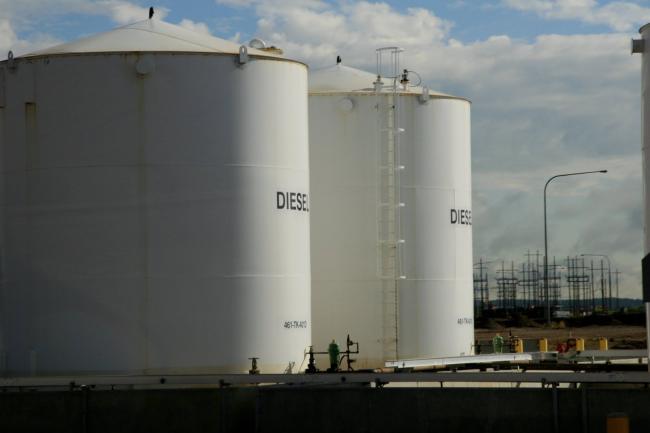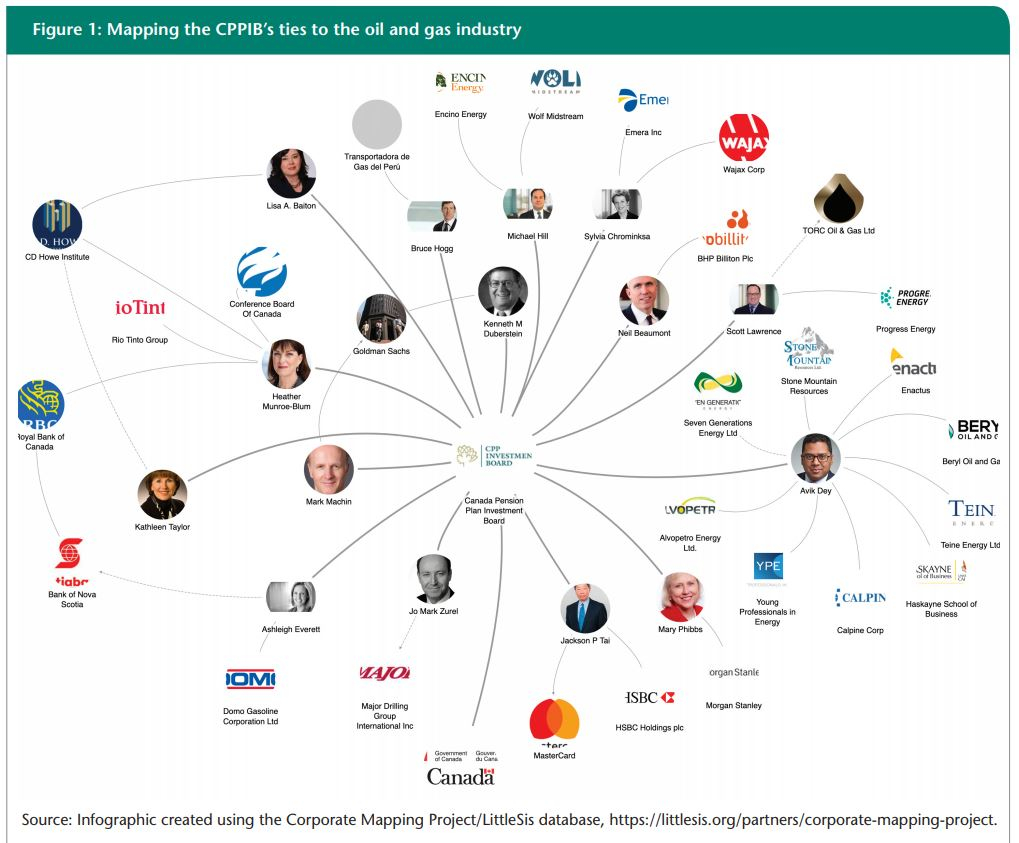Articles Menu

November 20th 2019
Canada’s biggest pension fund says it's “unfathomable” that the fossil fuel sector could wield disproportionate influence over its investment decisions, after a new report claims members of its board of directors and staff are "entangled with the oil and gas industry."
The Canada Pension Plan Investment Board (CPPIB), the Crown corporation that manages the country’s $400-billion public retirement fund, rejected new research Tuesday by the Corporate Mapping Project that argued the fund's relationships with the industry presented a “dangerous” situation that partially explains why it has not yet ditched billions of dollars in fossil fuel-related investments.
The fund signalled in a recent sustainable-investment update how it is more focused than ever on understanding the “risks and opportunities” climate change presents, and that it is pressing large carbon polluters to improve their environmental performance.
But the Corporate Mapping report shows the CPPIB has more than $4 billion invested in top fossil fuel firms around the world, billions more in smaller firms and infrastructure and several staff and board members with “formal relationships” with energy firms.

While it’s not uncommon for institutional investors to have staff sit on the boards of the companies they invest in, "these relationships deserve more public scrutiny” in the context of climate change, the researchers argue, because holding the planet to an acceptable level of global heating will require the fossil fuel industry to keep unburned reserves in the ground.
“The interests of oil and gas companies are finding their way into the decision-making that the Canada Pension Plan is undertaking,” said James Rowe, a co-investigator with the Corporate Mapping Project and an associate professor at the University of Victoria’s School of Environmental Studies, in an interview on Nov. 19.
“That’s dangerous in terms of the climate emergency, because the interests of those fossil fuel companies are in direct contradiction to the interests of Canadian beneficiaries and basically the rest of us — because their goal is to continue to burn as much carbon as they can... their pursuit of self-interest is a real threat to ours.”
The report, called “Fossil Futures,” says the pension plan’s holdings include hundreds of millions of dollars in market value in the Russian energy firms Gazprom, Rosneft, Lukoil, Novatek and Tatneft, as well as Chinese energy giants CNOOC, PetroChina and Sinopec, Japan’s Inpex and Canadian Natural Resources. The figures are from CPPIB's foreign publicly traded equity holdings as of March 31, 2019.
The Canada Pension Plan Investment Board says it is “unfathomable” that the fossil fuel industry could disproportionately influence such a massive and diversified portfolio as theirs, after Corporate Mapping Project claims otherwise.
The CPPIB also has $2.8 billion invested in top Canadian oil and gas companies, and has made other investments like $1.34 billion in U.S. gas pipelines and $1.4 billion in a gas project off Ireland’s coast, the report states. Overall, Rowe said, the pension-plan board has around $8 billion in equities associated with the fossil fuel industry.
The report also maps out the CPPIB’s ties to the oil and gas industry, specifically singling out several people. These include: board chairwoman Heather Munroe-Blum, who also serves on the board of the Royal Bank of Canada, which has a large oilsands stake; board member Ashleigh Everett, who is president of a company that owns retail gasoline chain Domo Gasoline; and board member Sylvia Chrominska, who is on the board of industrial-products provider Wajax Corp. which is involved in the oilsands. A number of senior staff are included as well.
Rowe said these connections aren't the "singular and only cause" of the fund's fossil fuel holdings but "help to explain" why it has been "slower than other major financial institutions in addressing climate risk." The European Investment Bank, for example, promised last Friday to end its own fossil fuel financing by 2022, while Sweden’s central bank said last Wednesday it had sold off oilsands bonds.
“We’re not convinced that most Canadians realize that the Canada Pension Plan is pretty heavily invested in fossil fuel companies, when 60 per cent of Canadians voted for parties with pretty strong climate plans,” he said. “Canadians care about climate change, and so we think they would be interested in this information.”

The CPPIB, speaking via a response it sent unattributed to National Observer, said “by its very nature, any highly seasoned, professional board would have business backgrounds and expertise across asset management, insurance, telecommunications, food, manufacturing, real estate, retail, education, public policy, to only scratch the surface.”
“Beyond strong governance expertise, collectively understanding hundreds of sectors across a global portfolio is vital as fiduciaries. The premise one sector disproportionately influences one of the most diversified portfolios in the world is simply unfathomable,” the CPPIB added.
The fund recently released a 2019 update to its sustainable-investing report, which notes the CPPIB is developing a “firm-wide view” of climate change to assess climate risks. It said it has incorporated climate change considerations more centrally, added more team members to the program and launched a framework requiring investment teams to “perform bottom-up analyses of climate change risks and opportunities on material investment.”
"We continue to lead and participate in collaborative engagements alongside other Canadian and global investors. These collaborative engagements press large GHG (greenhouse gas) emitters in oil and gas, utilities and other sectors to improve disclosure related to GHG emissions, strategies and performance," a section reads.
"We will continue pressing for additional enhanced disclosure to better enable investors to assess the risks and opportunities presented by climate change."
CPPIB also said it supported 19 climate change-related shareholder resolutions over the last yearly period of reporting, several of which "sought deeper disclosure" on pollution management, including on methane, as well as the resilience of the asset portfolio, low-carbon energy research, public-policy intervention and risks to the supply chain.
The Corporate Mapping Project is jointly led by the Canadian Centre for Policy Alternatives, the University of Victoria and the Parkland Institute and supported by the Social Science and Humanities Research Council of Canada.
[Top photo: File photo of diesel fuel storage tanks at an oilsands facility in 2014. Pembina Institute Photo]